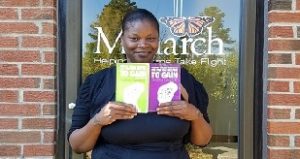For Shelisha Campbell Writing is Therapy, but Her Work is Turning into Much More

Shelisha Campbell isn’t one for sugar coating. Perhaps that’s why her writing is so powerful. As a self-described lifelong writer, Campbell’s poetry has helped her through some of the most challenging times in her life, including her challenges with schizophrenia.
“I’ve been writing poetry since I was a little girl. It’s therapy for me. It’s from the heart and it’s real. If I’m feeling angry or hurt, I write. I write about how God brings me through it and I make a negative situation a positive one,” said Campbell.
Campbell arrived at Monarch about four years ago after exploring therapy options at other organizations in the Laurinburg area.
“I wanted somebody I could really trust. I could be up one minute and then be down the next. So, when I go to Monarch for my therapy, it does help me, but I can still help myself by writing. I can tell them how this helps me and it actually helps me communicate with my therapist, and that makes me feel good,” said Campbell.
Campbell’s therapist Louvonda Townsend said she agrees. Campbell’s writing is a hobby that is encouraged for her therapy.
“Shelisha has made positive changes in herself through writing and in therapy. She is not very trusting to systems and struggles with filtering her thoughts, so when she writes, she is very honest with her emotions. I encourage her to continue to write to express herself with words and not anger or violence,” said Townsend.
It’s clear Campbell’s work is more than a hobby, it’s a talent. Her writing has turned into two published books of poetry: “Poetry Brain Through the Pain Has Help Me to Gain” and its second volume, which were both published in 2015.
“It is success stories like this that help others find courage to overcome the stigma society has with mental health. She didn’t allow her struggles to debilitate or define her. Instead, she embraced them with great confidence and a lot of determination to achieve whatever she set her mind on. Shelisha is living proof that maintaining a positive mind will lead to a positive life,” said Rosa Locklear, a referral coordinator at Monarch.
The first book focuses on Campbell’s personal struggles. Poems like Life and If This Was You take you through some of Campbell’s experiences with loss, looking for love, how her faith and her children keep her going through her struggles with schizophrenia, and even her disdain for social media in Face-book.
“I don’t Facebook, I face God,” said Campbell. “Volume two is about relating to and living in a world with issues like immigration, women’s rights, changes in the White House. It hits all different points,” said Campbell. “People with mental health diagnoses are really smart. If we have someone positive telling us we can do it and helping us through it, that plays a huge part in our success,” said Campbell.
That same sentiment is shared by Karen Nance, also a therapist at Monarch. Nance and Campbell first crossed paths about 15 years ago, when Campbell was at one of her lowest points. She called a mobile crisis team where Nance was working at the time. It was then that Nance got a glimpse of Campbell’s writing and how it helps her cope.
“I can’t take credit for Shelisha’s God-given talent, but I always have encouraged writing as a coping strategy. With any kind of mental health disorder, you have to figure out what works best for each person and her writing does for her,” said Nance.
Nance said she’s excited about Campbell’s success and growth since the first time they met and looks forward to catching up with her.
“No one should be limited in striving to achieve their goals no matter what their diagnosis. To remind someone they are good enough, that they have a right to achieve is what therapy is all about,” added Nance.
“She struggles daily due to the severity of her diagnosis, but she is goal oriented and highly motivated to provide a better life for her children,” said Townsend.
Campbell says her biggest inspiration are her three children. She has two boys; a 13-year-old and an eight-year-old. Her youngest is her seven-year-old daughter. All three children have been diagnosed with ADHD, but like Campbell, they are battling through. She said her youngest son is already exercising his own writing talent.
“He’ll write about how people call him ugly, how he makes good grades because I stay on him and he can’t go outside and play until his homework is done. He wrote one called Black Child. It’s pretty cool because it’s so unique and that’s what inspired me to write Black Woman,” said Campbell.
While writing has served as a tool for her and her family to cope with their diagnoses, she said she hopes her poetry will help anyone who reads it regardless of where they are from or their struggles in life.
“I love writing and I love helping people. I hope and pray that my writing will touch someone. Not just people struggling with their mental health, but anyone. We all have good days and bad days,” said Campbell.”
Campbell plans to continue publishing poetry and to schedule book signings. She also has two novels in the works with tentative release dates set for later this year.
Posted on: Wednesday May 17, 2017
